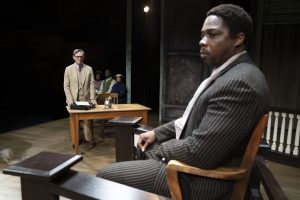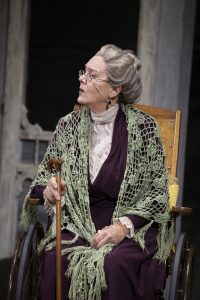
It is rare these days for a non-musical to receive a national tour. It has to have a superior script and production or a bankable name in the leading role. Aaron Sorkin’s stage adaptation of Harper Lee’s enduring novel, To Kill a Mockingbird, has both of the former and Richard Thomas as Alabama attorney Atticus Finch provides the latter.
Now at the Kravis Center through Sunday, all rise and pay tribute to such an estimable rarity.
Lee’s novel is one of the most read in classrooms across the country, with its uncomfortable depiction of blatant racism leading to frequent library-banning backlashes. And, of course, there is the Oscar-winning 1962 movie version with Gregory Peck as widower Finch, voted by the American Film Institute as “the greatest hero of all American cinema.”
So Sorkin was treading on dangerously familiar ground when he took on the task of a new take on Mockingbird. Fearlessly, however, he both pays tribute to Lee’s original creation and strikes out on his own with significant deviations.

The core of the play remains the trial of hulking black Tom Robinson, accused of raping white Mayella Ewell. It is hardly a spoiler in the Deep South of the 1930s to concede that he will be convicted, despite an impassioned defense by Finch and evidence that clearly exonerates Robinson.
The case is an eye-opening understanding of the American justice system for Finch’s pre-teen children, Jem and Scout, both pointedly played here by adults who narrate the production and look back on that fateful summer. From the perspective of age, they are able to see their father’s flaws rather than the usual idealized image of justice advocate and instructive single parent.
Thomas fills Finch’s well-worn shoes well, adopting a slight Southern lilt and cadence, a folksy but wily lawyer, out of his depth in a criminal case, but compensating with determination and passion. Despite the character’s recognition of its futility, Thomas rises to deliver a compelling summation at the trial.
Clad in tomboy overalls, Scout Backus is a worthy representation of mischievous, inquisitive Scout Finch, a role she played as a replacement on Broadway. Her brother Jem feels a bit underwritten, but Justin Mark compensates well, though he tends to be overshadowed by Steven Lee Johnson as visiting neighbor Dill Harris, a role Lee patterned on her childhood pal, Truman Capote.
Adaptor Sorkin consciously expanded and deepened the story’s two prominent black characters, Tom (Yaegel T. Welch), and Calpurnia (Jacqueline Williams), the Finches’ maternal cook. Both take the opportunity to challenge Atticus, pushing back against his white savior stereotype. Even the blatantly racist characters, Mayella (Mariah Lee) and her father Bob Ewell (Ted Koch) are allowed some nuance that makes them more dimensional.

And do not overlook a remarkable bit of casting in the minor supporting role of Mrs. Dubose, the Finches’ elderly, bigoted neighbor. She is played by Mary Badham, Oscar-nominated 60 years ago for her debut performance as Scout in the Mockingbird movie.
The episodic narrative bounces back and forth from the courtroom to the Finches’ front porch, thanks to the seamless direction of Bartlett Sher and the simple, but effective scenic design by Miriam Buether.
Although originally written in 1960, the bold choices of Sorkin and Sher have erased whatever cobwebs may have settled on the material since then. And perhaps current racial tensions have made To Kill a Mockingbird all the more relevant today.
TO KILL A MOCKINGBIRD, Kravis Center Dreyfoos Hall, 701 Okeechobee Blvd., West Palm Beach. Through Sun., Jan. 7. $39-$119. 561-832-7469 or visit kravis.org.